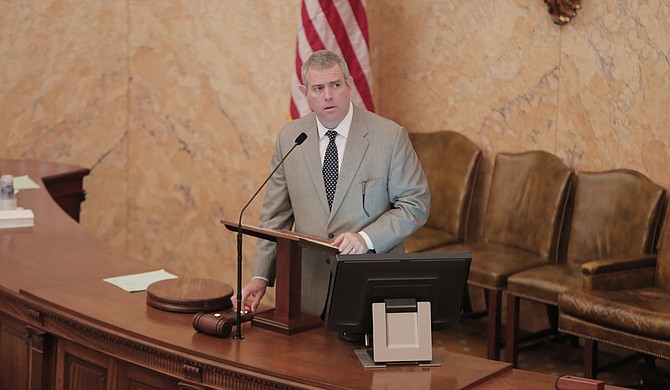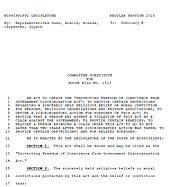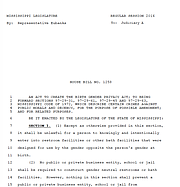Speaker Philip Gunn authored the "Protecting Freedom of Conscience from Government Discrimination Act," which opponents say would allow discrimination against LGBT citizens. Photo by Imani Khayyam.
Kim Davis went to jail in Kentucky for not issuing same-sex marriage licenses, but circuit clerks in Mississippi might not have to if the "Protecting Freedom of Conscience from Government Discrimination Act" becomes law. The Mississippi House of Representatives bill passed this morning by a vote of 80-39, but it has been held on a motion to reconsider.
Religious beliefs based on three points are protected under the act: marriage is a union between one man and one woman; sexual relations are properly reserved to that marriage; and male/female refer to an individual's immutable biological sex determined at birth.
Rep. Andy Gipson, R-Braxton, presented the bill on the floor today, after it passed through the Judiciary-B Committee on Thursday. Gipson said the bill "provides a layer of protection against state discrimination" against individuals and state government employees for holding religious beliefs that go against the Obergefell U.S. Supreme Court ruling last June that legalized same-sex marriage nationally. Gipson said the bill protects individuals' right to believe that marriage is between one man and one woman.
In an interview earlier this week, Sarah Warbelow, legal director at the Human Rights Campaign, said the bill takes elements of several pieces of legislation, including the First Amendment Defense Act, and brings them altogether to look on its face like a religious liberty act, which she said is an important American value.
"This doesn't advance American religious liberty—it allows people to discriminate against LGBT people and hide behind religion to do so," Warbelow told the Jackson Free Press.
Warbelow said the bill offers more authority to religious institutions than they should have Constitutionally.
Several Democrats voiced concerns about the bill, which would protect some individuals while allowing discrimination against LGBT citizens. Rep. Adrienne Wooten, D-Ridgeland, said a part of the bill would actually allow discrimination without any state government interference. The bill says, "[T]he state government shall not take any discriminatory action against a state employee ... on the basis that such employee lawfully speaks or engages in expressive conduct based upon ... a sincerely held religious belief or moral conviction."
"Why are you giving people a pass for doing their governmental duty?" Wooten asked.
Rep. Gipson said circuit clerks and judges have asked for this legislation and that the bill does not prohibit activity—such as issuing same-sex marriage licenses—but it does allow them "recusal from authorizing or licensing lawful marriages" based on their religious belief that marriage is between a man and a woman.
"This is not undoing, avoiding or trying to roll back what the Supreme Court said (in Obergefell)," Gipson said. "At the same time, there's a competing right under the first amendment to worship and believe what we believe without government interference."
Rep. Charles Young, D-Meridian, questioned the state's authority to add provisions to federal law. "I think we both agree that federal law trumps state law, correct?" Young asked Rep. Gipson.
"Sometimes, gentleman," Gipson said.
After 30 minutes of debate and a failed amendment from Rep. Omeria Scott, D-Laurel, some representatives spoke on the bill before the House voted.
Rep. Edward Blackmon, D-Canton, decried the bill, saying it ignored the existence of reality and called it "anti-human." The bill's definition of male or female at birth ignores science, Blackmon said.
"Science has shown that being XX or XY does not necessarily determine your sexuality, nor does physical appearance," Blackmon told the House.
Blackmon said that sometimes people don't know who they are until they reach puberty, and if the bill passed would not change that. Additionally he told the House that these are not strangers but people that live in "our homes and our communities."
"People become who they are because God has made them who they are, and now we're using religion in the name of God to discriminate against these individuals," Blackmon said. "There's a group of people out there in our communities who deserve the same rights as anybody else."
Rep. Dan Eubanks, R-Walls, spoke after Blackmon in support of the bill. Eubanks, who works for a church, said that his church has had to re-do its policies and "can no longer let certain groups use our facilities because it opens us up to liability to be sued by other folks that we don't agree with their lifestyle." Eubanks cited his fundamental right to worship and said that elevating a "position" to a protected civil class is "dangerous ground."
"Who's infringed upon here? Is it the Christian or is it the person who makes a lifestyle choice?" Eubanks said. "Both of them are choices."
Rep. Eubanks has authored the "Birth Gender Privacy Act" which would require transgender individuals to provide written proof to use a bathroom assigned to the gender different than their gender at birth.
House Speaker Philip Gunn originally filed House Bill 1523, and on Friday, the House passed the bill on a vote of 80-39 but was held on a motion to reconsider.
Read more LGBT coverage at http://www.jfp.ms/lgbt and legislative coverage at http://www.jfp.ms/msleg. Email state reporter Arielle Dreher at [email protected].





Comments
Use the comment form below to begin a discussion about this content.
comments powered by Disqus